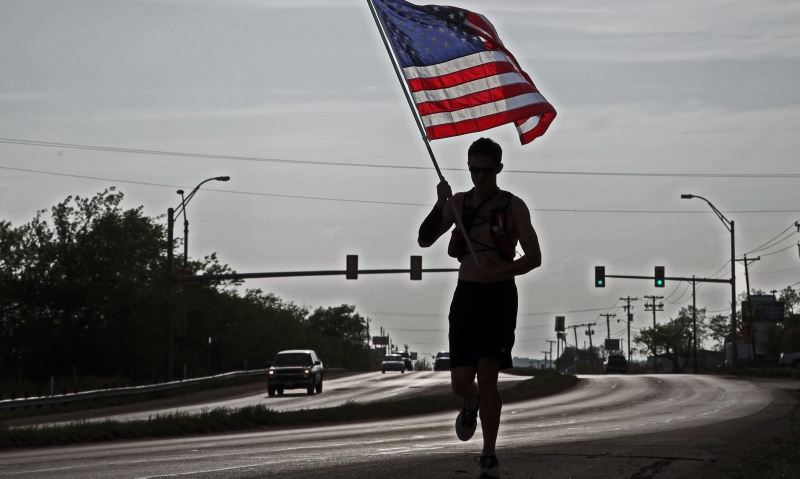
'Into the Light' interweaves the stories of Sgt. Brendan O'Toole and his 3,600-mile journey across the U.S. to raise awareness for mental health, and Dr. Barbara Van Dahlen, a clinical psychologist.
Imagine returning home from war with invisible injuries, not knowing how to cope with depression or post-traumatic stress disorder (PTSD) as you struggle to assimilate back into society.
That was reality for Sgt. Brendan O’Toole, a Marine Corps veteran who completed two deployments, including one to Afghanistan. Like most veterans plagued by survivor’s guilt or shame, O’Toole suffered in silence.
But fortunately for O’Toole, he made it his mission "to find goodness in himself." And to honor the selfless men and women who fought for the nation’s freedom.
O’Toole set out on a 3,600-mile run across the United States in 2012, with his support team, raising money and awareness for issues veterans face when returning from war, such as PTSD. His journey began in Oceanside, Calif., and ended 365 days later in New York City.
O’Toole’s story inspired a new feature documentary called "Into the Light," which serves as a conversation starter about how people can change the dynamic around PTSD and mental health.
“We decided it was a little more positive and inspirational to name this film, ‘Into the Light,’” film director Charlie Stuart said. “With Brendan, we wanted to depict him running into the light and finding that goodness and trust in himself as well as in the country.”
The film reveals an interesting notion regarding cultural stigmas and mental health, particularly in the military community. Part of Stuart’s attempt at changing the conversation is the inclusion of Barbara Van Dahlen, a clinical psychologist who had been silent for years before disclosing her family’s history of mental illness.
Van Dahlen’s estranged mother, whom she had not seen in 40 years, suffered from schizophrenia. Her father was a combat veteran who fought in World War II and suffered from PTSD. Even though he was a loving individual, Van Dahlen stated that her father had dramatic outbursts and never spoke about his combat experiences.
“(Barbara’s) father was afraid of her becoming a psychologist because he would be working with people like him,” Stuart said. “Although he had a lot of anger, he was a magnificent father who took care of (Barbara and her three siblings) when their mother had a psychotic break.”
Despite her father’s reticence, Stuart said Van Dahlen’s love and admiration for veterans stems from the wonderful relationship she had with him. As a result, Van Dahlen founded Give an Hour in 2005, to help heal and encourage veterans to stop suffering in silence.
Van Dahlen also recently initiated a national campaign called the Campaign to Change Direction that urges clinicians to offer more pro bono mental health services for veterans.
“She’s got about 7,500 to 8,000 people across the country who are giving free therapy to veterans (through her organization),” Stuart said. “Being the change agent that she is, Barbara then started this national campaign which is about changing the conversation around all mental health issues and getting rid of the stigma and shame.”
Stuart said Van Dahlen is an extraordinarily good, charismatic spokeswoman for veterans. She believes the best thing for the country to do is pull together and work in a positive way for veterans in need.
“There’s another key character in the film by the name of Matt Bein. (Matt) is a Marine veteran who Brendan came across during his run in the state of Alabama,” Stuart said. “He said talking about his story and having to tell it all the time (to doctors) really works. That’s basically the message of the film – to trust in a friend, a family member or maybe even a therapist. There shouldn’t be stigma or shame in talking about your story.”
For Stuart, "Into the Light" is about more than just shining a light on mental health. He said it’s about setting a courageous example, just as O’Toole and Van Dahlen have done, to improve the health and well-being of others going through hard times.
“Brendan evolves throughout the film,” Stuart said. “There are two things that happen. One is that he gets rid of the pills and mediations he was given to deal with his depression. That’s what simply worked for him. But the most important thing is that he met people along the way and learned that they were interested in his story.
“He says at the beginning of the film, ‘I went on the run because I wanted to find goodness in the country and I wanted to find goodness in myself.' It was a huge commitment for him to have served this country (twice) and then come back, run across the country and finish by (placing an American flag at the top of the Freedom Tower in New York). He is just a great example of what all veterans fought for.”
Stuart said the film will be released to PBS in May, in honor of National Mental Health Awareness Month. He hopes it will kindle a national movement that will connect civilians with veterans around the microcosm of loss, suicide, shame and guilt which often haunts those left behind.
“What we’d like for people to take away from the entire film, and Brendan’s story in particular, can be summed up toward the end of the film when Barbara Van Dahlen talks about trust,” Stuart said. “Brendan learned to trust people as he ran across the country. He learned that it was ok to share his story and people wanted to hear it.”
To join Barbara Van Dahlen's national campaign, visit http://www.changedirection.org. Watch a trailer of the film here.
- Veterans Healthcare

